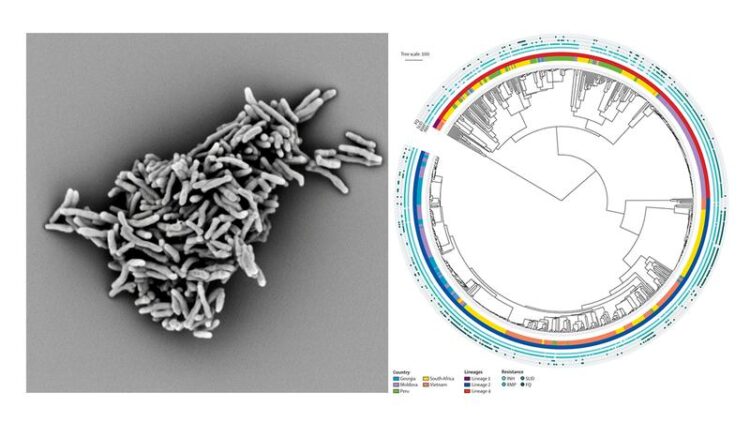Personalised antibiotic treatment strategies for tuberculosis patients

Electron microscopic image of Mycobacterium tuberculosis (left); circular phylogenetic tree depicting the relationship, origin, and individual drug resistances of 900 isolates of the Mycobacterium tuberculosis complex—a genetically related group of mycobacterial species (right).
© S. Homolka, T. Gutsmann/Borstel; CC BY 4.0/Finci, I. et al.
Tuberculosis is one of the leading causes of death worldwide, with an estimated 1.4 million deaths and ten million people infected annually. Resistant and multidrug-resistant (MDR) variants of the tuberculosis pathogen Mycobacterium tuberculosis pose a major threat to tuberculosis control and global health. Rapid detection of these patient-specific resistance patterns is therefore crucial for targeted treatment and successful control of the transmission of antibiotic-resistant tuberculosis bacteria—a goal that DZIF scientists have now taken a major step towards.
Mutations in the genome of multidrug-resistant (MDR) M. tuberculosis bacteria occur in different combinations in MDR tuberculosis patients. In an international study presented in the journal Lancet Microbe, DZIF researchers have now succeeded in identifying patient-specific resistance patterns using a bacterial genome analysis technique. The determination of these resistance patterns can serve as a basis for targeted personalised treatment of tuberculosis patients in the future.
“This large-scale study is the result of close collaboration between DZIF scientists in Borstel and Heidelberg, the global diagnostics alliance FIND, and partners in five countries where tuberculosis is highly endemic. The sequence analysis enables us to better understand the genetic basis for resistance to anti-tuberculosis drugs and therefore to provide faster, personalised anti-tuberculosis treatment,” summarises Dr Claudia Denkinger, last author of the publication.
“In the comparative genome analysis, we also observed, for example, changes in the genetic makeup of the bacteria that do not always lead to unambiguous results in classical bacterial culture-based resistance testing, but may potentially influence therapy,” says Dr Matthias Merker, one of the study’s first authors and Schleswig-Holstein Excellence-Chair junior research group leader at the Research Center Borstel.
“Our study also shows that genetic analysis of the bacteria already enables precise prediction of resistance to important tuberculosis antibiotics and can replace many of the classical and often lengthy tests,” adds Prof. Stefan Niemann of the National Reference Center for Mycobacteria at Borstel, one of the study’s final authors. “In the future, we plan to further expand this bacterial genomic analysis technique specifically in tuberculosis focal points in southern Africa, Eastern Europe and Central Asia.”
The work was supported by the Bill & Melinda Gates Foundation, the German Center for Infection Research (DZIF) and the Schleswig-Holstein Cluster of Excellence “Precision Medicine for Chronic Inflammatory Diseases.”
Wissenschaftliche Ansprechpartner:
PD Dr. Claudia Denkinger
Universitätsklinikum Heidelberg
Claudia.Denkinger[at]Uni-Heidelberg.de
Prof. Dr. Stefan Niemann
Forschungszentrum Borstel, Leibniz Lungenzentrum
Stellv. Koordinator Tuberkulose
sniemann[at]fz-borstel.de
Originalpublikation:
Investigating resistance in clinical Mycobacterium tuberculosis complex isolates with genomic and phenotypic antimicrobial susceptibility testing: a multicentre observational study, Finci I. et al., Lancet Microbe, 2022, DOI: 10.1016/S2666-5247(22)00116-1.
Weitere Informationen:
https://www.dzif.de/en/personalised-antibiotic-treatment-strategies-tuberculosis… DZIF-press release
Media Contact
All latest news from the category: Life Sciences and Chemistry
Articles and reports from the Life Sciences and chemistry area deal with applied and basic research into modern biology, chemistry and human medicine.
Valuable information can be found on a range of life sciences fields including bacteriology, biochemistry, bionics, bioinformatics, biophysics, biotechnology, genetics, geobotany, human biology, marine biology, microbiology, molecular biology, cellular biology, zoology, bioinorganic chemistry, microchemistry and environmental chemistry.
Newest articles

Silicon Carbide Innovation Alliance to drive industrial-scale semiconductor work
Known for its ability to withstand extreme environments and high voltages, silicon carbide (SiC) is a semiconducting material made up of silicon and carbon atoms arranged into crystals that is…

New SPECT/CT technique shows impressive biomarker identification
…offers increased access for prostate cancer patients. A novel SPECT/CT acquisition method can accurately detect radiopharmaceutical biodistribution in a convenient manner for prostate cancer patients, opening the door for more…

How 3D printers can give robots a soft touch
Soft skin coverings and touch sensors have emerged as a promising feature for robots that are both safer and more intuitive for human interaction, but they are expensive and difficult…





















